最新高中英语牛津译林版模块十一课文原文unit1
- 格式:doc
- 大小:961.50 KB
- 文档页数:4
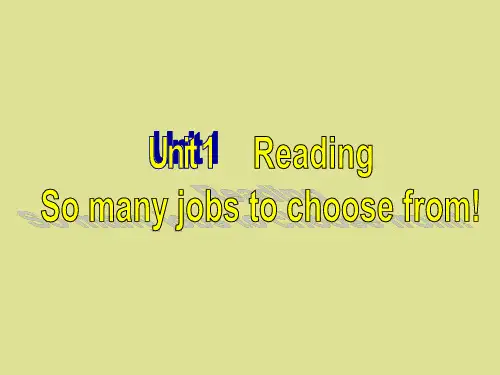
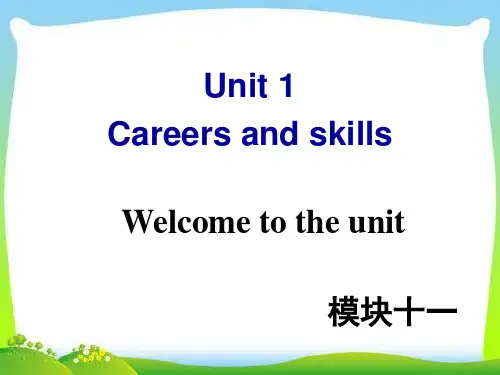
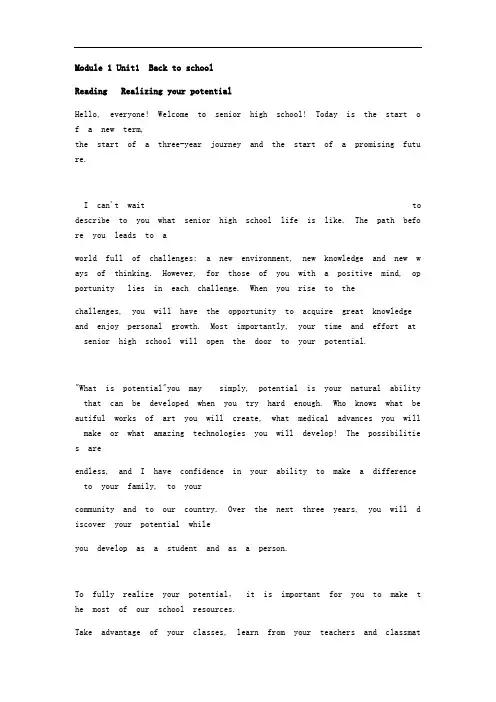
Module 1 Unit1 Back to schoolReading Realizing your potentialHello, everyone! Welcome to senior high school! Today is the start o f a new term,the start of a three-year journey and the start of a promising futu re.I can't wait to describe to you what senior high school life is like. The path befo re you leads to aworld full of challenges: a new environment, new knowledge and new w ays of thinking. However, for those of you with a positive mind, op portunity lies in each challenge. When you rise to thechallenges, you will have the opportunity to acquire great knowledge and enjoy personal growth. Most importantly, your time and effort at senior high school will open the door to your potential."What is potential"you may simply, potential is your natural ability that can be developed when you try hard enough. Who knows what be autiful works of art you will create, what medical advances you will make or what amazing technologies you will develop! The possibilitie s areendless, and I have confidence in your ability to make a difference to your family, to yourcommunity and to our country. Over the next three years, you will d iscover your potential whileyou develop as a student and as a person.To fully realize your potential,it is important for you to make t he most of our school resources.Take advantage of your classes, learn from your teachers and classmates and make use of ourschool facilities. There are also a lot of school activities for you . Join club or two, and take anactive part in different sports。
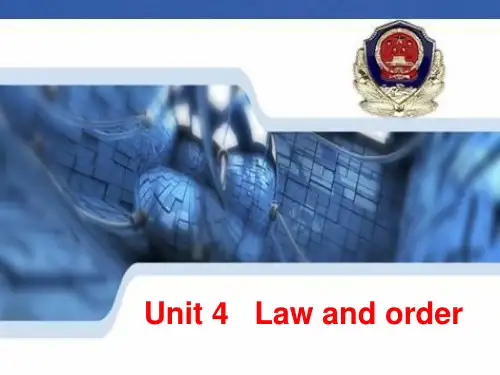
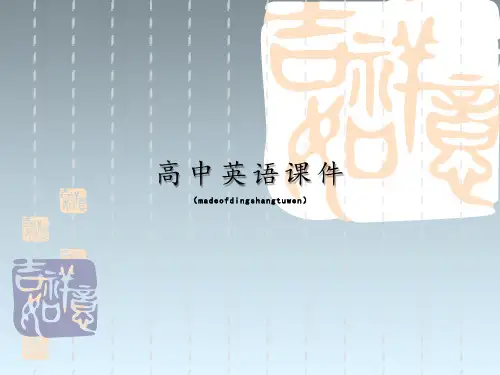
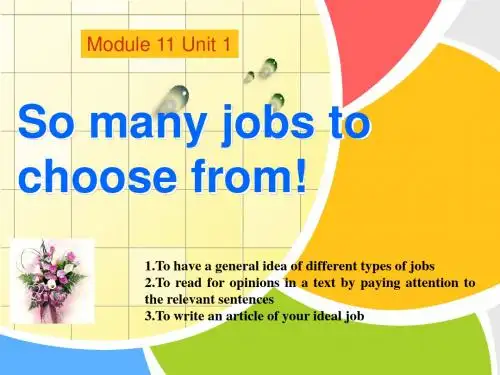
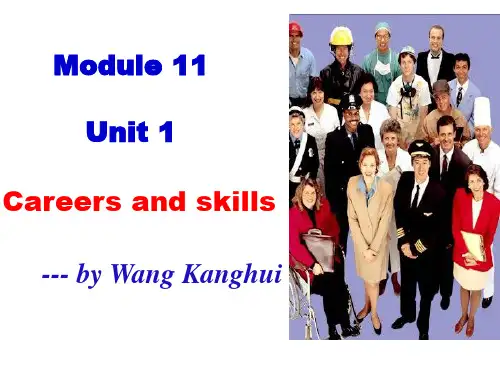
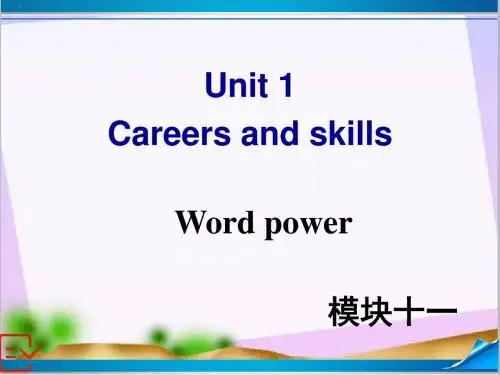
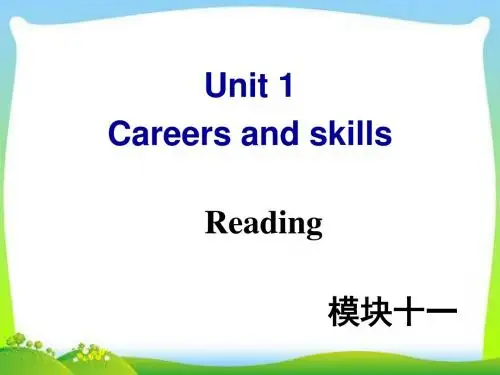
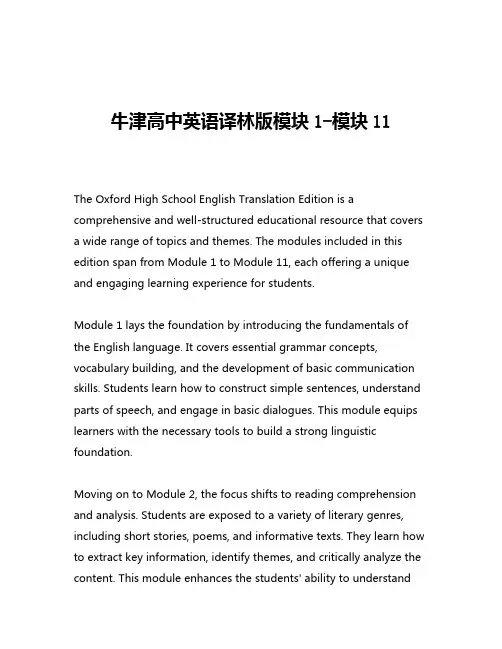
牛津高中英语译林版模块1-模块11The Oxford High School English Translation Edition is a comprehensive and well-structured educational resource that covers a wide range of topics and themes. The modules included in this edition span from Module 1 to Module 11, each offering a unique and engaging learning experience for students.Module 1 lays the foundation by introducing the fundamentals of the English language. It covers essential grammar concepts, vocabulary building, and the development of basic communication skills. Students learn how to construct simple sentences, understand parts of speech, and engage in basic dialogues. This module equips learners with the necessary tools to build a strong linguistic foundation.Moving on to Module 2, the focus shifts to reading comprehension and analysis. Students are exposed to a variety of literary genres, including short stories, poems, and informative texts. They learn how to extract key information, identify themes, and critically analyze the content. This module enhances the students' ability to understandand interpret written materials, preparing them for more advanced academic tasks.Module 3 delves into the realm of writing, guiding students through the process of crafting effective compositions. From personal narratives to persuasive essays, learners explore different writing styles and techniques. They learn how to organize their thoughts, develop coherent arguments, and use appropriate language to convey their ideas effectively. This module equips students with the skills necessary for successful academic and professional writing.In Module 4, the emphasis is on developing oral communication skills. Students engage in discussions, debates, and presentations, honing their ability to express themselves clearly and confidently. They learn how to articulate their thoughts, respond to questions, and adapt their communication style to different contexts. This module enhances the students' public speaking abilities and prepares them for real-world interactions.Module 5 focuses on the integration of technology in language learning. Students explore the use of digital tools and resources to enhance their English proficiency. They learn how to effectively utilize online dictionaries, grammar tutorials, and language learning applications. This module equips learners with the necessary digital literacy skills to navigate the modern, technology-driven world.Module 6 introduces the study of literature in depth. Students delve into the analysis of classic works of fiction, poetry, and drama. They explore literary devices, themes, and the historical and cultural contexts that shape literary works. This module cultivates the students' appreciation for literature and strengthens their critical thinking skills.In Module 7, the emphasis shifts to the study of English as a global language. Students examine the spread of English worldwide, its role in international communication, and the diversity of English dialects and accents. They explore the cultural and linguistic implications of the English language's global dominance, fostering a deeper understanding of its societal impact.Module 8 focuses on the development of research skills. Students learn how to effectively gather, evaluate, and synthesize information from a variety of sources. They explore the principles of academic research, citation styles, and the ethical use of information. This module prepares learners for the demands of higher education and equips them with the necessary skills for conducting independent research.Module 9 delves into the realm of creative writing, allowing students to explore their imaginative potential. They experiment with differentgenres, such as short stories, poetry, and playwriting, and learn how to craft compelling narratives, develop memorable characters, and employ literary techniques. This module fosters the students' creativity and self-expression.In Module 10, the emphasis is on the study of English for specific purposes. Students explore the linguistic and communication needs in various professional and academic fields, such as business, science, or engineering. They learn how to adapt their language skills to the unique requirements of these specialized domains, preparing them for future career or academic pursuits.Finally, Module 11 serves as a culmination of the learning journey, offering students the opportunity to showcase their comprehensive English proficiency. Through a series of integrated assessments, learners demonstrate their mastery of reading, writing, listening, and speaking skills. This module provides a platform for students to demonstrate their growth and readiness for advanced academic or professional challenges.The Oxford High School English Translation Edition, with its well-structured modules, offers a comprehensive and enriching learning experience for students. By covering a diverse range of topics and developing a wide array of language skills, this educational resource equips learners with the knowledge and competencies necessary forsuccess in their academic and professional endeavors. The seamless integration of language learning with cultural awareness, critical thinking, and technological proficiency makes this edition a valuable asset for students seeking to excel in the English language and thrive in the global landscape.。
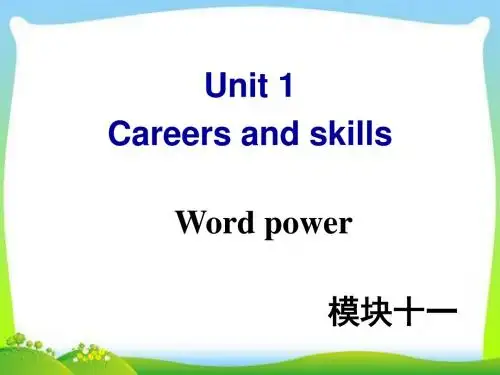
高中英语牛津译林版模块十一课文原文u n i t1牛津译林版模块十一Unit 1 ReadingSo many jobs to choose from!by Dai LinglingThe last year of high school is a time for hard work and also a time to reflect. At this time, you have to start thinking about the future and what you want to do after graduation. In this article, I am going to discuss some of the choices available to you and which jobs are best suited to you: popular jobs, more unusual jobs or everyday jobs.When choosing a career, you should consider all the aspects of a job. Some jobs may seem very dull but are very important to society, while others can appear very exciting but are actually very difficult and boring. One example is the so-called‘glamorous job’ of being a model or an actor. Would you like to be famous,wear diamonds, go to parties and relax on cushions in private jets or helicopters? In reality, these people have to spend long hours travelling ,with all their baggage packed in suitcases or trunks, and only a very small number of them are successful. Many actors, actresses and models hold ordinary, less glamorous jobs, often working as waiters and waitresses, in order to support themselves. Meanwhile, those who are successful and famous have to deal with constant media attention. They are also under huge pressure to appear young and beautiful. Most actors and models are always on a diet, and many have had painful operations to make their faces and bodies look more attractive. It does not seem that glamorous now, does it? Maybe a career as a local grocer would be a better option.Other popular professions for young people include careers in law or business. Many people have ambitions to become successful as a lawyer or business person, but they do not consider the stress and pressure that come with these jobs. These can be well-paid and interesting jobs, but you also have to work very long hours. Also, sometimes as a boss in the business world, you have to make difficult decisions that hurt people, and lawyers can face tough moral problems.On the other hand, some people find more unusual jobs that are better suited to their talents and interests. A few years ago, when I was walking in the Grand Canyon National Park in the USA, I met a man who had a very unusual job. He was living by a stream in a tent surrounded by technical equipment, and his only neighbors were the birds and squirrels in the nearby trees. His job was to check noise pollution in the park zone. He loved to camp, and his job was like a holiday for him. It was very easy to see that he enjoyed doing his job. There are many other people doing unusual jobs, such as a person who tastes beer at a brewery and probably consumes one litreof beer a week, a person who designs fireworks and a person who tests rides for amusement parks. All these people love their jobs, which might not be popular, but are interesting regardless.In the same way, many ordinary jobs may look plain, but they are necessary to society. As we go through our daily lives, we meet many different kinds of people----shopkeepers, who sell us things in shops; drivers, who drive trams and buses transporting us around the city; barbers, who cut our hair in barbershops, and cleaners, who clear up our rubbish. These jobs may not seem very attractive, but they are all important. For example, if no one was to collect the rubbish, the streets would soon become very dirty, the number of rats would increase, and disease would spread. These people, who perform such ordinary but vital tasks, allow others to go about their daily lives.When you think about your future career, remember that some glamorous jobs can be rather difficult and that some ordinary jobs can be quite important. All of them together, though, help society function.Unit 1 ProjectWhat is the best career for you?Read each point and circle the alternatives which describe what you think or like to do. For each point, you can choose more than one answer. There are no right or wrong answers.1 I would rather_____.a fix or mend thingsb solve maths problemsc draw or paintd lead a group discussione sell things or promote ideasf set or systems on a computer2 I am ______a practicalb curious about many thingsc creatived friendlye self-confidentf well organized3 For a hobby, I prefer____a playing sportb reading booksc taking photographsd watching sporte debating with othersf collecting things4 I like to _____a build thingsb do lab experimentsc design thingsd play team sportse meet important and famous peoplef organize things5 I can ____a operate tools and machines easilyb use a computer easilyc sing, act or dance welld work well with otherse give good speechesf keep accurate records6 I like to _____a be around animalsb solve problemsc use my artistic ideasd work with people to help theme work with people to make moneyf work with dataNow look at your answers and figure out how many times you have chosena=□ b=□ c=□ d=□ e=□ f=□The letters represent different types of people. Find the letter which you chose the most often and look at the description which corresponds with it on the next page. This will tell you what type of person you are and what careers would probably suit you best. If there was no one letter chosen most, look at the two letters most often chosen.a.Realistic (people who like to do things)These people have practical or athletic abilities and prefer to work with objects, machines, plants and animals or to be outdoors. Suitable jobs include: bus driver, butcher, greengrocer, carpenter, chef, firefighter, machine operator, sailor and tailor.b.Investigative (people who like to think)These people like to observe, learn, analyse, evaluate and solve problems. Suitable jobs include: chemist, dentist, engineer, physicist and software engineer.c.Artistic (people who like to create things)These people have artistic abilities and like to work in free and open situations (without regular office hours) using their dreams and creative ideas. Suitable jobs include: actor, architect, dancer, photographer, theatre studies/music/language teacher, pianist, violinist and writer.d.Social (people who like to help others)These people like to work with people to educate, inform, help, train or cure them. Suitable jobs include: librarian, maid, nurse, police officer, stewardess and teacher.e.Enterprising (people who like to lead)These people take great pleasure in influencing and persuading others, or leading and managing an organization. Suitable jobs include: hotel manager, journalist, lawyer, salesman/saleswoman, shopkeeper and travel agent.f.Conventional (people who like to organize things)These people are good at administration, like to work with data and can carry out tasks or follow other people’s instructions. Suitable jobs include: accountant, clerk, secretary, typist and telephone operator.。